RENÉPAPESCH

Hello there!
This is my personal site showing my skills and interests. Currently I'm working as a consultant in field of data intensive applications.
Feel free to check out my interests and my resume. I'm looking for interesting people and discussions, so if you like don't hesitate to contact me!
Interests

Marketing and Design
The best ideas and products are worthless without having the necessary attension and an appropriate wrapping.

Networks and Complex Systems
Astonishing insights can be gained by analyzing and simulating networks constructed by the interaction of things or beings.

Open and Big Data
The dissemination of public data has the potential to build flexible structures and reduce corruption. New business services can be built on the foundation of available data.

Globalization and Foreign Cultures
The world with all its facets offers exciting opportunities and only by looking at the whole, it is possible to grasp them.

Cutting Edge Technology
New inventions, products and trends are followed by me with tremendous attention.

The World of Tomorrow
I'm interested in recent trends and developments in resources, society and politics. We have to be prepared for our future.

Social Interaction and Social Processes
Practical experience in workshops and theoretical courses have aroused my interest for this topic.

Startup and Entrepreneurship
Starting a company is one of my childhood dreams. Ideas are present but the market is not ready yet.
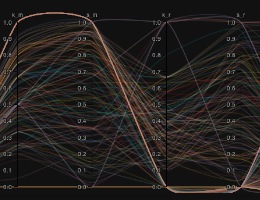
Analytics and Visualization
Data is the new gold. It lays in secret and has to be mined. Visualization is the art of turning data to jewelry.
Hobbies

Traveling and Trekking
Staying in foreign countries and meeting new people is my passion. Exploring countries by my own or in small groups
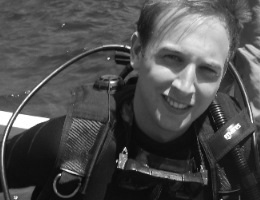
Scuba diving
Watching the underwater environment is exciting and relaxing at the same time. I practiced it during my recent trips in Thailand, Philippines or the Bahamas.

Snowboarding
In winter times you can find me on slopes in Austria. I'm one of the last people who use carving-boards.
Network properties and characteristics of the European Maritime Transport Network
The study of complex networks is to prove if the network under observation exhibits common non-tivial properties different from random network.
The MTN can be classified as a complex network because (a) it shows following properties: (a) scale-free degree distribution (b) the small-world property (c) a high clustering coefficient and (d) degree-degree correlations. The figure below summarizes the main findings.
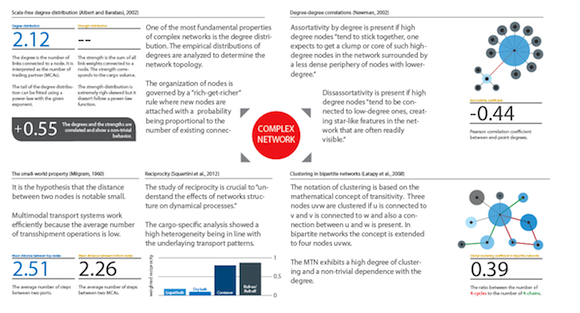 Read more →
Read more →
The top-level MTN contains a snapshot of the maritime transport system including 434 top-nodes (ports) and 227 bottom-nodes (Maritime Coastal Areas (MCAs)). This weighted directed network (WDN) is constructed using the total cargo flows from ports to MCAs and vice versa aggregated over 16 different types of cargo (e.g. crude oil, containers, etc.) in the 4th quarter of 2009. Furthermore, the network exhibits a bipartite characteristic because no information of port-to-port flows is available. Generally, bipartite statistics are computed for the global network including both types of nodes but for the further analysis the focus is set to port nodes only. Especially distributions and further properties are not studied for MCAs.
Check out the Infographic containing the main findings.
The container volume within the Mediterranean
The figure below shows the distribution of 70 MT container volume in 2010 represented in “Burj Khalifas“ between 20 central seaports and 20 Mediterranean countries.
The busiest ports are located along the main shipping line allowing the efficient transshipment between container hubs and gateway ports. Most of the Med-to-Med traffic goes or comes from Italy and Spain because most of the gateway ports are located in these countries.
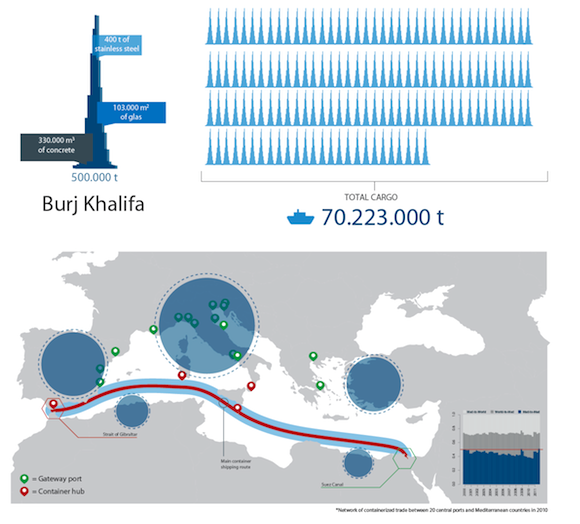 Read more →
Read more →
Although the Med-to-Med container traffic grew from 16.4 Mio. to 23.3 MT between the 3rd quarter of 2002 and the 3rd quarter of 2008, the relative share decreased steadily in the last decade. Exceptions are the period during the economic crisis and the year 2011 where around 50% of the total traffic was caused by Mediterranean countries. Figure 6.3a compares the evolution of the market share of Med-to-Med traffic (bottom), World-to-Med traffic (middle) and Med-to-World traffic (top). The red horizontal line indicates symmetry between Mediter- ranean traffic and non-Mediterranean traffic. While the Mediterranean traffic has increased by 41%, in the same period non-Mediterranean traffic raised by 76%. In absolute terms the non- Mediterranean container volume grew from 18.3 MT in the 3rd quarter of 2002 to 32.3 MT in the 3rd quarter of 2008. If we oppose the incoming cargo volume with the outgoing cargo volume it can be concluded that the incoming traffic has more than doubled (+106%) and the outgo- ing traffic increased by 51% in the same period. We can safely assume that the one part of the growth in incoming and outgoing traffic is due to the increase of the number of trade partners. As a matter of fact the enormous differences between the growth rates state that the increase of trade partners is secondary.
Check out the Infographic containing the main findings.
Evolution of the “rich-club“ in the Mediterranean sea
The networks below shows the “rich-club“ consisting of 20 central seaports and 20 Mediterranean countries where most of the traffic flows. Each dark blue node represents a port and each light blue node stands for a countries. The links between the nodes are container flows in 1000 tonnes.
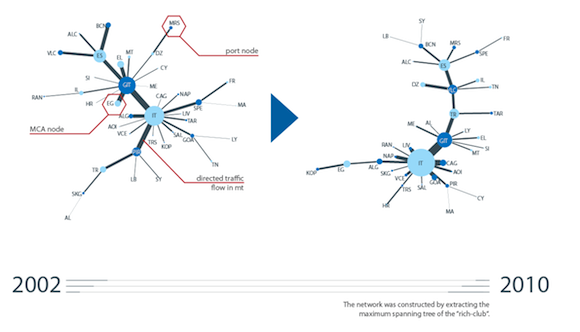 Read more →
Read more →
For sake of simplicity the method of maximum spanning tree was applied to reduce the complexity of the network making visualization possible. The advantage is that all nodes are included in the final visualization and that there are no overlapping links. For each node only the strongest trade link is drawn. Thus if a MCA u is connected to a seaport v it means that port v is the main trade partner of MCA u. Using network visualization it is possible to map values to different shape, size and color. In case of the networks the size of a vertex was set to the amount of container volume in the given quarter and the color corresponds to the node type.
In all networks it is clearly visible that Gioia Tauro has an important position in the network because it maintains a high number of trade connections and handles a huge amount of contain- ers. Thus it can be concluded that Gioia Tauro is a hub in the network being in line with the fact that in reality it is also designed for the purpose of transshipment. The main trade partners for Gioia Tauro are Italy and Egypt followed by Spain. While the trade relations with Italy and Spain are relative stable over time the trade between Gioia Tauro and Egypt exhibit a non-trivial behavior. It nearly doubled in the first two quarters of 2009 until it totally collapsed. The huge increase is clearly visible in Figure 6.8c. The reason why Egypt is attached to Valencia in Figure 6.8d is that Valencia managed to outrun Gioia Tauro as the main trade partner for Egypt in 2010. Beside Egypt also Turkey had won influence over the years. In 2002 the main trading partner of Turkey was Piraeus but was replaced by Gioia Tauro in 2008. During the crisis the trade relationship between Piraeus and Turkey dropped to a low level though in 2010 Piraeus had remarkable growth rates. However, the trade between Valencia and Turkey increased steadily in the last decade from 132 KT in the 1st quarter of 2002 to 350 KT in the 1st quarter of 2010. It seems that Valencia gains more and more influence as one of the major trade partners of Turkey. Additionally, in the end of 2010 a break down for the relationship between Gioia Tauro and Turkey is visible.
Check out the Infographic containing the main findings.
Trends in the containerized trade within the Mediterranean
Several interesting patterns were detected by analyzing the evolution of the containerized trade within the Mediterranean. It is important to note that some findings might be due missing data, coding mistakes or double counting in the data.
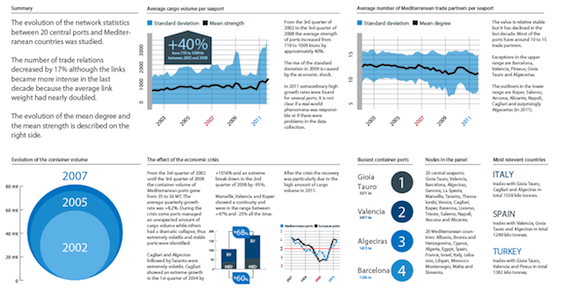 Read more →
Read more →
Check out the Infographic containing the main findings.
Experience
Consultant
Junior Consultant
Freelancer
YouthTec Junior Enterprise
Computer and network administrator
Architectural Office Dungl
Education
Master of Business Informatics
Technical University of ViennaNetworks and -markets, Large Scale Data Analysis & Visualization
Master thesis: A Network Analysis of the Evolution of Maritime Transport in the
Mediterranean, Supervisor: Univ.Prof. Mag. Dr. Hardy Hanappi
Exchange Semester
Universitat Politècnica de Catalunya. FIB.Software Engineering, Software Project with RUP
Bachelor of Business Informatics
Technical University of Vienna(Experimental) Economics, Theory of Innovation, Theory of Networks
Bachelor thesis: Integration and Competition in Seaport Networks, Supervisor: Univ.Prof. Mag. Dr. Hardy Hanappi
Soft Skills
Business Knowledge
multi-sided platforms, e-commerce, business model generation, pipeline management, graph theory, linear programming, regression analysis, predictive models, project management
Computer Knowledge
Pentaho BI, SAP HANA, SAP Data Services, IBM DB2, MySQL, Project R, igraph, SuperSTAR, Java, PHP, UML, XML, JSON, jQuery, D3.js
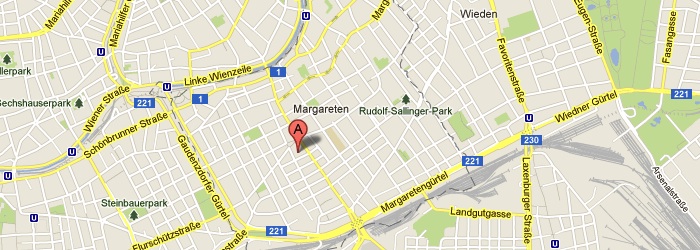

Please feel free to contact me over a social network, write an e-mail or use the contact formular.